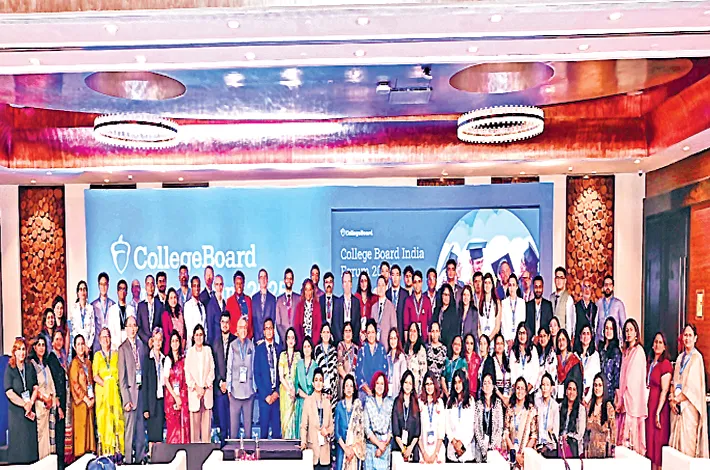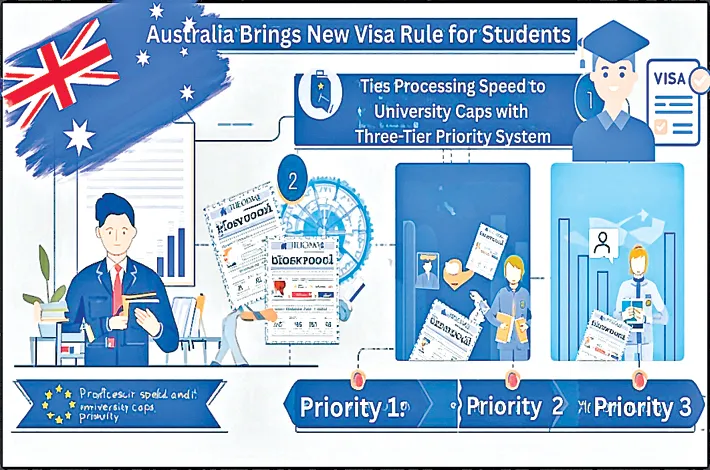College Board to launch two new Advanced Placement courses
17-11-2025 12:00:00 AM

Simple Vishwakarma Mumbai
The 2025 College Board India Forum in Mumbai brought together senior leaders from MIT, Oxford, Princeton, NUS, NMIMS, and dozens of Indian institutions, marking one of the strongest global turnouts the event has seen. The fifth edition of the forum focused on the future of admissions, digital transformation, and students' changing expectations in an AI-powered world.
This year, the College Board announced it would introduce two new AP courses, AP Business with Personal Finance and AP Cybersecurity from 2026. The courses fall under a new initiative called AP Career Kickstart, which will contribute to bringing career-relevant learning to high school students far earlier. With financial literacy and digital security fast becoming life skills, these new offerings signal a new turn: blending academic rigour with real-world readiness.
India’s presence in the AP and SAT ecosystem keeps growing at a rapid pace. Meanwhile, India’s presence in the AP and SAT ecosystems continues to grow rapidly. The number of Indian schools offering AP programmes has doubled in just one year, AP sections have grown by 65%, student enrolment is up by 9%, and more than 50 Indian universities now accept SAT scores.
Speaking to The Free Press Journal, Rushi Sheth, Vice President for the College Board’s International Division, said the Mumbai edition reflects the Board’s expanding engagement beyond Delhi. “This is our fifth India forum, and we’re excited to bring it to Mumbai after two years in the capital. It reflects our commitment to Tier-1 and Tier-2 cities because more educators and students are gaining access to SAT and AP programmes,” he said, adding that next year’s forum will be held in Bengaluru.
Admissions in focus
The Mumbai forum, Sheth explained, was designed to move beyond the usual conversations around global mobility. “Everyone attending already understands the value of global exposure. What they really want are deeper conversations,” he said.
One of the highlights was a mock admissions masterclass crafted around real-world decision-making. Since Indian students often present exceptionally strong portfolios, Sheth said the goal was to build empathy on both sides of the admissions table. “We gave counsellors hands-on experience of how tough it is to choose between very qualified applicants. Anyone can say selective admissions is difficult, but feeling that difficulty helps them guide students better.”
International student caps
With concerns around proposed caps on international students resurfacing in the US, UK, Canada, and Australia, Sheth clarified that most of these remain discussions, while there are no legal caps in force as of October 2025. “There’s talk, but nothing has passed into law not in the U.S., not in the U.K., not in Australia. Universities operate independently from political cycles. Their commitment to global student communities doesn’t change every four years,” he said. He added that during the forum’s morning plenary, leading admissions officers reaffirmed this independence.
Fully digital SAT
A major milestone celebrated at the forum was the complete transition of the SAT to digital mode. “No more paper,” Sheth said. “Paper can get lost, delayed, or compromised. The digital SAT is encrypted, secure, delivered instantly, and scored faster.”
The AP programme has also transitioned to digital delivery. The big announcements, however, were the two new AP courses - Cybersecurity and Business with Personal Finance. Designed with university faculty and endorsed by employers, these courses aim to prepare teenagers for a marketplace where early career awareness is becoming common.
“Today’s students don’t wait until 22 to think about careers. They want to build things, grow brands, and start businesses. We want to give them space in high school to explore that,” Sheth said.
He illustrated the urgent need for financial literacy with a personal observation: on his own phone’s home screen, eight out of 13 apps deal with money. “Students spend and save money too, but many have no formal understanding of taxes, loans, or interest rates. We want to change that.”
SAT returns to pre-pandemic momentum
Even as some universities reinstated test requirements post-pandemic, Sheth said SAT participation has not declined. “In the class of 2025, more than two million students took the SAT, the highest since before COVID. Students value the SAT because it gives them a choice. A strong score helps them stand out; if they don’t want to send it, they can withhold it.”
He added that universities value the SAT for its predictive power, noting that it contributes to holistic review and helps institutions assess if a student is likely to succeed and graduate on time.
India’s AP and SAT figures tell a story of rapid expansion. “Indian schools with authorised AP instructors doubled this year. Three Indian universities now credentialise AP for credit or placement, and over 50 accept SAT scores,” Sheth said.
One SAT score, he emphasised, now opens doors to universities across the U.S., U.K., Singapore, and India. “A student applying to Princeton, Oxford, NUS, Ashoka, or FLAME no longer needs separate exams. That’s great for access.”
Sheth confirmed that new SAT test centres are being set up nationwide. “We are expanding capacity in Lucknow, Pune, and several other cities. Becoming a test centre is free; we just need basic paperwork. Students should not have to travel far to take the SAT.”
AP aligns with India’s education landscape
While the IITs and IIMs continue to dominate specialised education, Sheth said AP fits naturally with India’s rising liberal arts ecosystem. “AP replicates first-year university courses in the liberal arts model, so it aligns beautifully with institutions like Ashoka, FLAME, Shiv Nadar, and others that offer interdisciplinary learning.”
He further pointed out that even one practice test boosts SAT scores by an average of 25 points, while three or more can improve scores by 60+ points. “There’s no magic formula, just practice. And we give it away for free.”
AI in classrooms and testing
Sheth said educators should not avoid AI but treat it as a tool that accelerates learning without replacing authenticity. “For SAT and AP, students still need to demonstrate skills independently. That won’t change. But AI can support instruction.”
He cited AP Computer Science Principles as an example: students can now use AI for coding during coursework but must explain their design decisions during assessments. “That ensures authenticity. AI should push students higher, not cause cognitive decline.” He also hinted at future AI-powered SAT prep tools. “I’d love to see guided tutoring powered by AI. If it helps students perform their best, we’ll explore it.”








